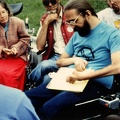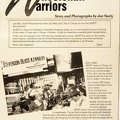DISCLOSURE
JULY-AUGUST I991
From Coast To Coast
ADAPT Battles For Home Attendant Care
by C.I. Zander
Photo by Tom Olin: Two protesters in wheelchairs curl forward with arms raised to their faces as police or security tip them back on their back wheels. The person in the front (possibly Barb Guthrie) has a bumper sticker on the side of the chair that reads "I support my country."
Capiton reads: ADAPT protestors being removed from HHS entrance in April action.
“Almost everywhere we go, we meet somebody who has a friend or relative who's disabled — a brother, a cousin, a father or mother. That's why people support us. That's why they believe in what we are doing."
Danny Saenz of ADAPT (American Disabled for Attendant Programs Today) was talking about the recent string of direct actions which has taken them from Baltimore to Washington to Dallas to Chicago and back to Washington again. ADAPT's primary issue: put Medicaid money into direct home attendant care of the disabled and get them out of nursing homes. ADAPT 's primary target: HHS Secretary Dr. Louis Sullivan, also known as “Lonesome Louie" and “Dr. No" because whatever ADAPT asks for, he refuses.
“All we want is a meeting. . ."
“All we want is a meeting," says Saenz, who is from the Austin, Texas ADAPT chapter. “But he always finds some excuse.” Tom Olin of Tennessee Adapt adds: "When we were in Washington recently, we thought that we had a meeting with Sullivan. But HHS went back on their word. So we closed down their building."
Adapt members blocked the exits of the Health and Human Services building and forced guards to close it down for two hours on June ll. Police were reluctant to make arrests not only because it is bad publicity for them to be seen carrying off the disabled but also because most police stations do not have adequate care facilities.
Tuesday, June 11, may go down as the biggest day in ADAPT's history for more reasons than the shutting down of HHS. Members began early at the American Health Care Association Convention where Sullivan was scheduled to speak. AHCA is a particularly galling organization to ADAPT because it is a lobbyist for the nursing home industry which receives billions in federal and state money for healthcare that ADAPT leaders describe as "inadequate," “wasteful” and “sometimes criminal."
ADAPT estimates that over 1.5 million disabled could be moved from nursing homes to attendant home care if the Medicaid benefits were the same or comparable.
Getting To Sullivan
Although many ADAPTers got into the Hyatt Hotel where the AHCA convention was being held, security forces were able to head them off and lock the auditorium where Sullivan was scheduled to speak. All except for one person. She was able to sneak in and got down to the front of the room in her wheelchair.
When Sullivan started his lecture, she also began speaking and gesturing to the audience, asking why Sullivan supported the agenda of nursing homes instead of the agenda of the disabled themselves. Several security police carted her off but ADAPT had, once again gotten Sullivan's attention.
Eventually, Sullivan snuck out of the hotel, reputedly through the back kitchen entrance. But, even then, several ADAPT members caught up with him at his expensive limo and shouted their demands for a meeting at him as he drove away.
Then ADAPT moved over to the HHS building where they blocked entrances and closed doum the building for a few hours. As National People's Action had done on their April visit, a few people got past the guards to some upper floor offices. But, of course, Sullivan was “not there."
To cap off the day, ADAPT met with Senator Kennedy's staff to talk about the proposed health care bill. “We called for a meeting when we were here before in April," says Olin. “But they said they didn't know who we were. So we told them to just watch the news on TV and they’d see us.”
What Kennedy’s staff and many other Washingtonians saw on TV then were another two direct actions which included blocking the HHS parking lot and the busy Baltimore intersection in front of the Social Security and Health Care Funding Administration building. ADAPT members said they wanted to illustrate what happens when they are locked in nursing homes. “It’s the same kind of feeling —— you can't leave when you want to. You need my permission," said Mike Auberger of Denver's Atlantis Community afterwards.
“I’m sympathetic. . ."
"I'm sympathetic to all these folks not able to get home, but this is a really minor inconvenience compared to the inconveniences suffered by those in nursing homes," said protester Nate Butler. A Washington Post photo showed ADAPT members lying down in front of police cars in a scene reminiscent of civil rights demonstrations of the 1960s. Some federal workers were irritated but many expressed sympathy for ADAPT’s views.
Other ADAPT actions this spring included cornering Sullivan in Chicago on May 14 and, again in Dallas on May 22 at the President's Committee on Employment of People with Disabilities Conference. ln Dallas, according to the June issue of Incitement, ADAPT’s national newsletter: “(Sullivan) began his talk, and, slowly and silently, one by one, ADAPT members dropped to the floor and began crawling toward his podium, waving the proposed meeting dates in the air. Though he tried to ignore us, Sullivan stumbled over his words several times. in the end, a sea of bodies lay on the floor before him. . -"
Sullivan's staff repeatedly says they won‘t meet with "radical" `groups`, but ADAPT leaders believe that this is just an excuse to avoid them. They note that Sullivan has plenty of time to meet with big money `groups` and lobbyists but that he ignores community-based `groups` whether they are "radical" or not.
One of ADAPT's strongest arguments for reallocating Medicaid nursing home funds to a home attendant care system is financial. Leaders believe that, in the same way that health insurance administration costs eat up money that should go to the people who have the medical problems, nursing homes end up making large profits while the disabled suffer.
Auberger says that nursing homes’ care costs are in the range of $30,000 to $60,000 a person a year but home care is in the $15,000-30,000 range. Auberger himself receives home care that averages about $2,000 a month. "Not only is it cost effective," he concludes, “it‘s the right to dignity and freedom of choice."
The bottom line for ADAPT is the redirection of 25% of the $23 billion that Medicaid currently spends on nursing homes to community-based attendant services programs. While some states have adequate home care services, most do not. So ADAPT believes the primary change must come through the allotment of federal funds.
“The nursing home industry is a billion-dollar industry — they give political contributions to politicians who protect their interests," says Lillibeth Navarro, an ADAPT member from California. “This is going to be a difficult struggle. But because our cause is right, because it touches practically everybody, we will prevail."
For more information on ADAPT programs, call 303 733-9324 in Denver, or S12 4420252 in Austin, Texas.
- Author
- Disclosure/NTIC National Training and Information Center
- Created on
- Friday 12 July 2013
- Posted on
- Thursday 9 June 2022
- Tags
- ADAPT - American Disabled for Attendant Programs Today, AHCA convention, Barb Guthrie, blocking doors, blocking intersection, cost effective, cost of nursing homes, crawl, Dallas, Danny Saenz, Disclosure, HCFA - Health Care Finance Admin., HHS - Health and Human Services, Incitment, Lillibeth Navarro, Mike Auberger, Nate Butler, NPA/NTIC, redirect 25%, Secretary Louis Sullivan, Senator Ted Kennedy, Tom Olin
- Albums
- Visits
- 872
- Rating score
- no rate
- Rate this photo


0 comments